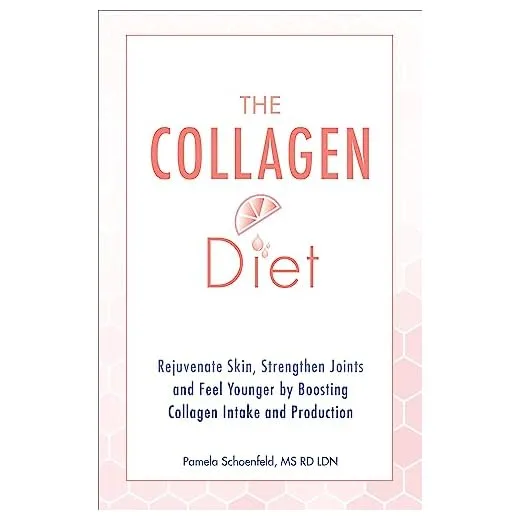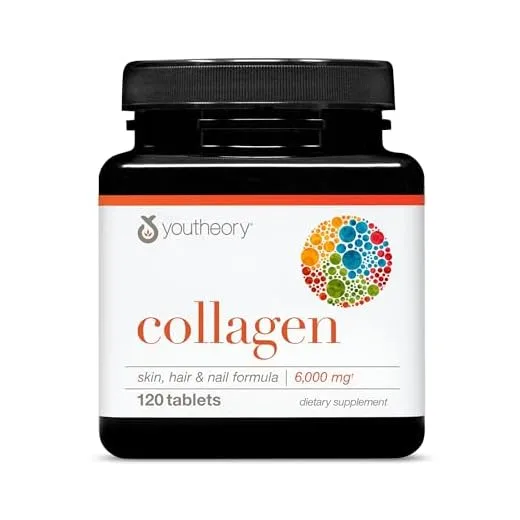The step-by-step guide on supporting collagen production through diet provides practical instructions on how to enhance collagen synthesis in the body. It offers tips and food choices that can help boost collagen production, contributing to healthy skin, joints, and overall well-being.
Boosting Collagen for Radiant Skin



Understand Collagen and its Importance
Understanding Collagen and its Importance
- Discover Collagen’s Role: Understand how collagen is a vital protein in the body, providing structure to skin, muscles, tendons, and bones.
- Explore Collagen Benefits: Learn about the benefits of collagen, such as improving skin elasticity, joint health, and wound healing.
- Influence Collagen Production: Evaluate how diet affects collagen production by incorporating foods rich in vitamin C, zinc, and antioxidants, which support collagen synthesis.
- Enhance Collagen Formation: Incorporate collagen-boosting foods like bone broth, fish, berries, citrus fruits, and leafy greens into your diet to promote collagen production naturally.
Include Vitamin C-Rich Foods
- Incorporate fruits like oranges, strawberries, and kiwis, as well as vegetables like bell peppers and broccoli in your daily meals.
- Ensure you are consuming Vitamin C-rich foods regularly to support collagen synthesis and overall skin health.
- Aim to include at least one serving of Vitamin C-rich foods in each meal to meet your daily requirement for this essential nutrient.
Eat Protein-Rich Foods
- Include Lean Proteins: Incorporate lean meats, fish, eggs, dairy, legumes, and tofu in your diet to supply essential amino acids required for collagen synthesis.
- Diversify Protein Sources: Ensure a variety of protein-rich foods to optimize collagen production and maintain healthy skin, hair, and nails.
- Prioritize Protein Intake: Make a conscious effort to consume sufficient protein from various sources daily for overall well-being and to support your body’s collagen needs.
Add Antioxidant-Rich Foods
Add Antioxidant-Rich Foods
- Include foods high in antioxidants: Incorporate a variety of berries, nuts, seeds, and leafy greens into your diet.
- Protect collagen from damage: These antioxidant-rich foods help shield collagen from harm caused by free radicals.
- Enhance skin health: Boost your skin’s health by regularly consuming these nutrient-packed foods rich in antioxidants.
Incorporate Collagen-Boosting Foods
- Include collagen-boosting foods in your diet: Incorporate bone broth into your meals, such as chicken or beef broth, to provide essential amino acids for collagen synthesis. Add salmon to your diet, a great source of omega-3 fatty acids that support collagen production in the skin. Integrate soy products like tofu or edamame for their genistein content, which can help increase collagen levels. Incorporate citrus fruits, such as oranges and lemons, which are high in vitamin C crucial for collagen formation.
Stay Hydrated
- Drink at least 8-10 glasses of water daily to maintain skin elasticity and hydration levels.
- Ensure you are consuming water throughout the day to support collagen synthesis in the body.
- Set a reminder on your phone or use a water bottle with measurements to track your water intake.
- Make it a habit to drink water before and after meals to stay adequately hydrated.
Limit Sugar and Processed Foods
- Avoid Sugary Treats: Minimize consumption of sugary treats like candies, cakes, and sodas to prevent collagen impairment.
- Cut Processed Foods: Eliminate processed items such as fast food, chips, and sugary cereals to help slow down skin aging.
- Opt for Whole Foods: Choose whole, natural foods like fruits, vegetables, and lean proteins to support healthy collagen production.
- Stay Hydrated: Drink plenty of water throughout the day to keep your skin hydrated and maintain collagen elasticity.
Consult a Dietitian or Nutritionist
- Consult a Dietitian or Nutritionist:
- Seek out a qualified dietitian or nutritionist.
- Discuss your goal of supporting collagen production through dietary choices.
- Follow personalized recommendations provided by the professional for an effective dietary plan tailored to your needs.
Strengthening Your Skin Naturally
This conclusion effectively summarizes the main points discussed in the blog post and provides a clear and concise message for the readers.
Essential Supplies
Maximizing Collagen with Nutrition
Maximizing Collagen Production: Tips and Techniques
- Maintain a healthy diet rich in collagen-boosting foods such as bone broth, fish, and leafy greens
- Use skincare products containing collagen-boosting ingredients like vitamin C, retinol, and peptides
- Protect your skin from sun damage by using sunscreen daily to prevent collagen breakdown
- Consider adding a collagen supplement to your daily routine to support collagen production from within
- Stay hydrated by drinking plenty of water to help keep your skin plump and support collagen synthesis
Boosting Collagen Production
How does UV radiation affect collagen production?
UV radiation can negatively affect collagen production in the skin. It can lead to the breakdown of collagen fibers, which are responsible for providing structure and elasticity to the skin. This can result in the appearance of wrinkles, sagging skin, and other signs of premature aging. UV radiation can also stimulate the production of enzymes that degrade collagen, further contributing to the loss of skin firmness and elasticity. To protect collagen production, it is important to use sunscreen and other sun protection measures when exposed to UV radiation.
What is collagen?
Collagen is the main structural protein found in the skin and connective tissues of animals and humans. It provides strength and elasticity to tissues such as skin, tendons, ligaments, and cartilage. Collagen is essential for maintaining the firmness and integrity of the skin and plays a key role in wound healing and joint function.
What role does collagen play in skin health?
Collagen is a protein that provides structure and strength to the skin. It helps maintain the skin’s firmness, elasticity, and smoothness. Collagen also plays a key role in wound healing and skin regeneration. As we age, the production of collagen decreases, leading to the formation of wrinkles and sagging skin. Maintaining healthy levels of collagen is crucial for overall skin health and youthful appearance.
What are some skincare ingredients that promote collagen production?
Some skincare ingredients that are known to promote collagen production include:
- Retinol: A form of Vitamin A that helps stimulate collagen production and reduce the appearance of fine lines and wrinkles.
- Vitamin C: An antioxidant that helps boost collagen production and brighten the skin.
- Peptides: Chains of amino acids that help stimulate collagen synthesis in the skin.
- Hyaluronic Acid: Helps hydrate and plump the skin, which can support collagen production.
- Niacinamide: Also known as Vitamin B3, it can help improve elasticity and promote collagen production in the skin.
How does collagen production differ in different parts of the body?
Collagen production can vary in different parts of the body due to factors such as the type of collagen being produced, the rate of turnover, and the presence of specific cells responsible for collagen synthesis. For example, skin cells called fibroblasts are a major source of collagen in the skin, while chondrocytes in cartilage and osteoblasts in bones produce collagen specific to those tissues. Additionally, factors such as age, hormonal changes, and environmental influences can also impact collagen production differently in various parts of the body.
What are the main types of collagen in the human body?
There are over 20 types of collagen in the human body, but the main types are Type I, Type II, and Type III. Type I collagen is the most abundant and is found in skin, tendons, bones, and organs. Type II collagen is mainly found in cartilage, while Type III collagen is found in skin, muscle, and blood vessels.
Are there any medical conditions that can affect collagen production?
Yes, there are several medical conditions that can affect collagen production. Some examples include Ehlers-Danlos syndrome, Marfan syndrome, osteogenesis imperfecta, and systemic sclerosis. These conditions can result in abnormal collagen synthesis or structure, leading to various symptoms and complications.
What role does vitamin C play in collagen production?
Vitamin C plays a crucial role in collagen production. It is essential for the enzymatic reaction that converts proline and lysine into hydroxyproline and hydroxylysine, which are important for stabilizing the collagen structure. Without sufficient vitamin C, collagen synthesis is disrupted, leading to impaired wound healing, skin aging, and other connective tissue-related issues.
Can exercise help in stimulating collagen production?
Yes, exercise can help stimulate collagen production in the body. When we exercise, it increases blood flow and circulation, delivering more oxygen and nutrients to the skin cells. This can help stimulate collagen production, which is essential for maintaining skin elasticity and firmness. Additionally, exercise can promote the production of growth factors that support collagen synthesis in the skin.
What are some factors that can negatively impact collagen production?
Some factors that can negatively impact collagen production include aging, smoking, excessive sun exposure, poor nutrition, high sugar consumption, and certain medical conditions such as diabetes and autoimmune diseases. Stress and lack of sleep can also affect collagen production.
How does collagen production change with age?
Collagen production decreases with age. As we get older, our bodies naturally produce less collagen, leading to a decrease in skin elasticity, joint flexibility, and overall structural support in various tissues. This decline in collagen production can contribute to the development of wrinkles, sagging skin, and joint stiffness commonly associated with aging.
How do collagen supplements affect collagen production?
Collagen supplements are thought to help support collagen production in the body by providing the essential amino acids and nutrients necessary for collagen synthesis. However, the scientific evidence supporting the efficacy of collagen supplements in increasing collagen production in the body is limited and more research is needed to fully understand their effects.
How is collagen produced in the body?
Collagen is produced in the body through a process called collagen synthesis. Specialized cells called fibroblasts are responsible for producing collagen. These fibroblasts secrete precursor molecules of collagen, which then undergo various modifications to form mature collagen molecules. The synthesis of collagen is a complex process that involves several steps, including post-translational modifications and assembly of collagen fibers. Vitamin C plays a crucial role in collagen synthesis by helping in the conversion of proline to hydroxyproline, an essential step in collagen formation.
Can diet influence collagen production?
Yes, diet can influence collagen production. Consuming foods rich in vitamin C, zinc, copper, and amino acids can support collagen synthesis in the body. Foods such as citrus fruits, bell peppers, strawberries, nuts, seeds, and lean protein sources can help promote collagen production. On the other hand, a diet high in sugar, processed foods, and excessive alcohol consumption can have a negative impact on collagen synthesis.



Leave a Reply